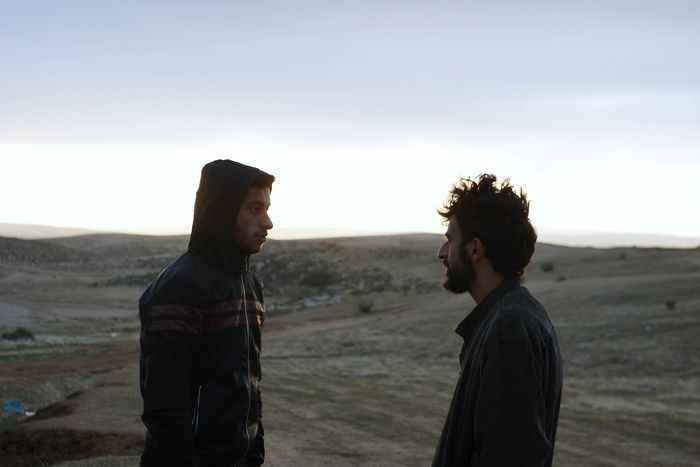Save this article to read it later.
Find this story in your accountsSaved for Latersection.
Hes eventually joined by fellow journalist Abraham, an Israeli who disagrees with his governments policy toward Palestinians.

The film tracks both Masafer Yattas systematic demolition and their collaborative, often wistful friendship.
(The directors are expected to attend the ceremony in March.
)The film expandedto more theaters around the country last week thanks to financing from the its producers.
Adra and Abraham, who separately join our Zoom interview, know that their work isnt done.
Basel, I sawyour posts on Xfrom earlier this week about the latest settler attack in Masafer Yatta.
I know there has been more violence in the West Bank against Palestinians since the Gaza cease-fire.
Are you all right?
How have things been?Basel Adra:Im doing okay.
Thank you for asking.
The last attacks were really, really hard and scary.
The last one was two days ago.
Last week as well, there was another attack on another friends home.
They burned his car.
We are okay physically, but not okay in how we feel.
There is no protection.
It is what it is.
You expected they might do this, because a soldier had threatened you earlier in the documentary.
What do you both remember about that experience?
We work here from my home and we move in the field together from here.
They have the privilege that they can use the camera in front of the soldiers and film.
They are not Palestinians.
For me, its different.
Basel, it looks like youre behind a rock wall.
How much of what was happening could you see from where you were?BA:Not everything.
I was in a place where I made sure I could watch them and they couldnt watch me.
Yuval, what do you remember about that night?
Many times they break the camera or they take it, and its even more dangerous to film.
I dont think I even really argued with the soldiers.
And I just remember asking them, Are you doing this as revenge for the protest?
I talked to them in Hebrew.
Is it some kind of revenge or something?
They wouldnt respond to me.
And then the entire family was together and using humor to overcome the moment,in a way.
Rachel is the cinematographer, and shes amazing.
Physically, shes quite small, and she always manages to be in different situations and somehow fit in.
She goes really close to the soldiers.
I think shes one of the bravest people that I know, and she managed to film it all.
What do you think, Basel?
BA:I think its different motivations, but the soldiers are always filming.
Either they have cameras on their heads or on their chests, or they film with their personal phones.
Also, I think its just for fun, for the soldiers WhatsApp groups or for their families.
Its like, Were not going to let you look at us.
You are supposed to be looked at.
You are supposed to be surveilled.
You are supposed to be monitored.
Its the powerful that are supposed to look, not the person who is being controlled.
I think that also plays a role, alongside everything else.
That leads into my next question, which is about the settler attacks in the documentary.
Sometimes during the night, there would be attacks.
You wouldnt see in the night whos a soldier, and it might happen that they fire ammunition.
Thats the scary thing.
But in this instance, you two decide to keep filming.
I run there and I start to film.
I saw a very horrific scene of settlers everywhere, around peoples houses, smashing properties, throwing stones.
There were soldiers who were shooting tear gas and stun grenades and live ammunition.
They just wanted physically to catch me, for the camera, and attack me.
Luckily I ran out of their hands and I kept the documentation in my camera.
Yuval is on the other side, luckily, filming and saying to the soldier, Dont shoot him.
When the soldier saw that Yuval is filming him as well, he stopped.
Yuval, during one of these attacks, the settlers say to you, Go make some article.
Go make some video.
It was the morning.
I remember I never heard his voice like that.
Immediately my heart started racing and I ran to my car and I began driving.
We were standing and there were soldiers and masked settlers.
Some were throwing with their hands, so they were easy to dodge.
Then other rocks were with slingshots, so they came almost as fast as a bullet.
It was complete chaos.
And in these kinds of moments, youre not thinking about the film.
Its not why youre filming.
You are filming to have some way to survive this.
It was a very, very difficult moment.
And the camera is strong proof, evidence, of what happened.
Can you share how those children are being educated now?
In the beginning, the teachers and the students refused to.
Some of them jumped, even, from the windows to run to their homes.
And yeah, it was destroyed.
Its an important thing.
YA:Were really honored to be nominated for the Oscar.
I hope the Oscar can maybe change that.
We are also remembering that this is a very long journey, as Basel says in the film.
We are also remembering that to keep our feet on the ground.